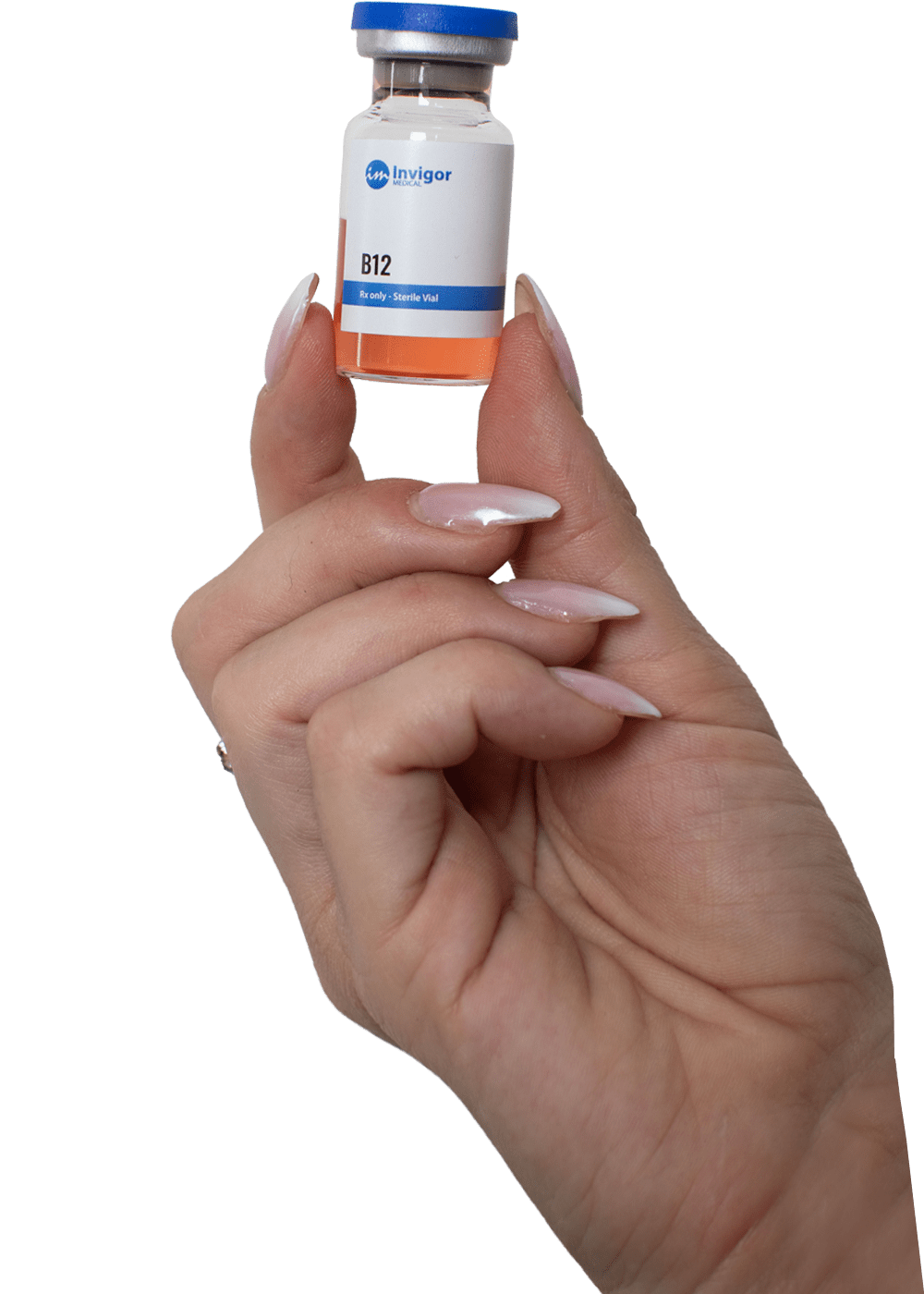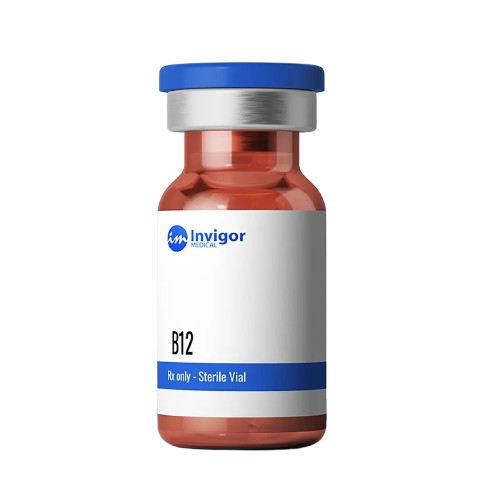Vitamin B12, also known as cobalamin, is a water-soluble vitamin that is naturally found in animal products, including meat, fish, and dairy products, and it is also available as a dietary supplement, an injectable (commonly known as vitamin B12 shots), and in fortified foods.1 It is important to consume enough vitamin B12 in your diet, as a deficiency can cause a variety of symptoms, including fatigue, weakness, cognitive and neurologic dysfunction, and anemia.2
Vitamin B12 plays several important roles in the body, including:3
- Helping to produce energy by converting food into glucose
- Maintaining healthy nerve function
- Making DNA, the genetic material in all cells
- Helping to form red blood cells
- Helping enzymes to function as a cofactor
- Controlling homocysteine levels
Vitamin B12 deficiency can lead to several health problems, including anemia, nerve damage, and neurologic symptoms such as memory loss and difficulty concentrating. Vitamin B12 deficiency is relatively rare, but it is more common in people who follow a vegetarian or vegan diet, as it is found almost exclusively in animal-derived foods. It is also more common in older adults, as the body’s ability to absorb vitamin B12 from food decreases with age. People who regularly take metformin, proton pump inhibitors, and H2 blockers, or have gastrointestinal disease are also at increased risk.3
If you are concerned that you may be deficient in vitamin B12, speak with a healthcare provider for a proper diagnosis and treatment. If you are receiving vitamin B12 injections, it is important to store them correctly so they retain their full potency.
Table of Contents
Do Vitamin B12 shots Have To Be Kept In The Fridge?
Most vitamin B12 supplements do not need to be refrigerated. However, it is generally recommended to store them in a cool, dry place, away from heat, moisture, and light. This is because heat, moisture, and light can all contribute to the degradation of the vitamin and reduce its effectiveness.4
If vitamin B12 is lyophilized, such as in some forms of methylcobalamin, the medication should be refrigerated after mixing.
Some vitamin B12 supplements, such as liquid drops or sublingual tablets (tablets that dissolve under the tongue), may also need to be refrigerated to maintain their stability and effectiveness. It is important to follow the manufacturer’s storage instructions, as different vitamin forms may have different storage requirements.
How Long Are B12 Shots Good For Once Drawn Up?
B12 shots are typically good for 24 hours once they are drawn up and prepared for injection, as light exposure can degrade the potency of the medication. After 24 hours, they should be discarded, and a new injection should be prepared. It is important to follow proper handling and storage guidelines for B12 shots to ensure that they are safe and effective.

What Are The Potential Benefits Of Vitamin B12 Injections?
If you have developed a vitamin B12 deficiency, restoring vitamin B12 to healthy levels can improve your energy level and resolve symptoms typically associated with vitamin B12 deficiency. Some potential benefits of vitamin B12 injections may include the following:
- Increasing energy levels: Vitamin B12 is necessary to produce energy in the body. People with vitamin B12 deficiency may feel tired and lethargic and have decreased physical energy. Vitamin B12 injections may help to increase energy levels in people with vitamin B12 deficiency.5
- Improving mood: Vitamin B12 is involved in producing neurotransmitters, such as serotonin and dopamine, which are important for mood regulation. Some people with vitamin B12 deficiency may experience depression or mood changes, and vitamin B12 injections may help to improve mood in these cases.6-8
- Boosting the immune system: Vitamin B12 is important for the proper functioning of the immune system. Vitamin B12 deficiency may increase the risk of infections, and vitamin B12 injections may help to boost the immune system.9,10
- Reducing the risk of anemia: Vitamin B12 is necessary for producing red blood cells, and a deficiency of vitamin B12 can lead to anemia. Vitamin B12 injections may help to reduce the risk of anemia.11
- Improving nerve function: Vitamin B12 is important for proper nerve function. Vitamin B12 deficiency may cause numbness and tingling in the hands and feet, cognitive impairment, and reduced neurotransmitter production in the brain and spinal cord.12,13
- May support weight loss: Vitamin B12 and other lipotropic nutrients may support weight loss efforts.14
Vitamin B12 injections are usually recommended for people with a vitamin B12 deficiency that cannot be corrected through diet and oral supplements. They may also be used to treat certain medical conditions that interfere with the absorption of vitamin B12 from the diet.

What Are Vitamin B12 Side Effects?
Vitamin B12 is generally well-tolerated and safe when taken at recommended doses. Most people do not experience any side effects when taking vitamin B12 supplements or consuming foods that are rich in vitamin B12.11
However, some people may experience vitamin B12 side effects when taking high doses of supplements. These may include:
- Nausea and stomach upset
- Diarrhea
- Constipation
- Injection site redness or swelling
- Itching
- Headache
- Dizziness
- Blood clots
- Swelling
In rare cases, some people may experience an allergic reaction to vitamin B12, which can cause symptoms such as hives, difficulty breathing, and swelling of the face, lips, tongue, or throat. Stop taking vitamin B12 supplements and seek medical attention immediately if you experience these symptoms.
It’s important to note that vitamin B12 supplements can interact with certain medications and medical conditions, so it’s always a good idea to talk to your doctor before starting any new supplement regimen.

How Do You Administer Vitamin B12 Injections?
If you are self-administering B12 shots at home, be sure to follow the instructions provided by your healthcare provider or pharmacist. If you have any questions about the proper handling or storage of B12 shots, it is important to consult with a healthcare professional.
Vitamin B12 injections are usually given in the muscle or under the skin. The specific instructions for administering a B12 injection will depend on the product used and the reason for the injection. It is important to follow the injection instructions provided by a healthcare provider or pharmacist, as well as any additional instructions that may be provided by the manufacturer of the specific B12 product being used.
Here are some general steps for administering a B12 injection:
- Gather the necessary supplies: You will need a sterile needle and syringe, alcohol wipes, adhesive bandage, cotton balls, and the vial of B12.
- Prepare the injection: Remove the cap from the needle and use the syringe to draw the appropriate amount of B12 from the vial. Replace the cap on the needle.
- Clean the injection site: Use an alcohol wipe to clean the injection site. Allow the skin to dry before proceeding.
- Inject the B12: Hold the syringe like a pencil and insert the needle into the injection site at a 90-degree angle. Push the plunger to slowly inject the B12.
- Dispose of the needle and syringe: Carefully remove the needle from the injection site and dispose of the used needle and syringe in a puncture-resistant container.
Following proper infection control practices when administering a B12 injection is important, including washing your hands and using a clean, sterile needle and syringe. If you have any questions about the proper technique for administering a B12 injection, it is important to consult with a healthcare professional.
Conclusion
Proper storage and handling of Vitamin B12 injections are critical for their effectiveness and safety. For those looking to buy Vitamin B12, understanding the need for refrigeration and appropriate storage conditions is as important as the injection itself. Making an informed decision about buying and storing Vitamin B12 can significantly impact its benefits. To learn more about the best practices for storing Vitamin B12 injections and to explore your options for purchasing, visit Invigor Medical.










